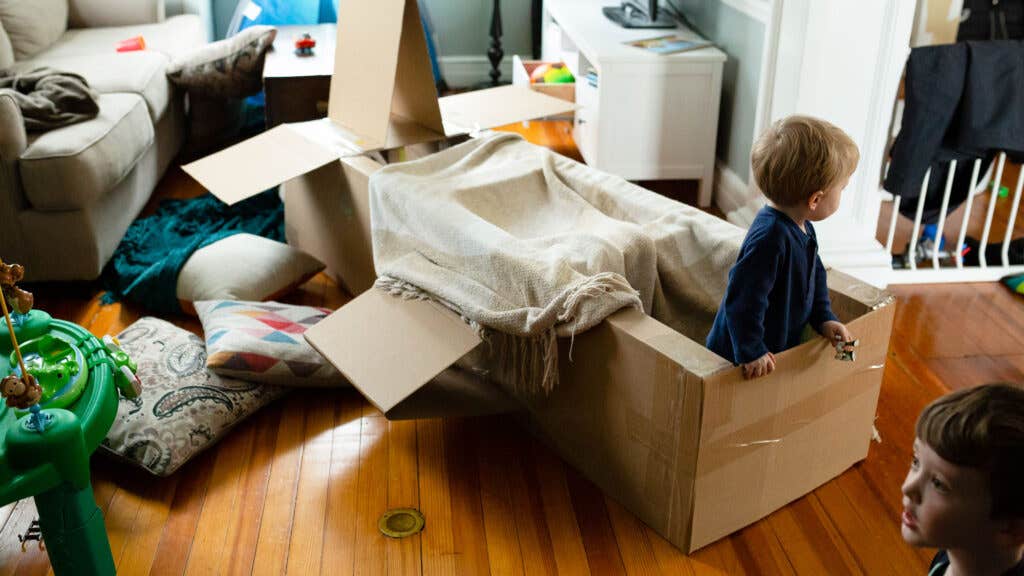HBR Readers on Juggling Work and Kids… in a Pandemic
[July 22, 2020: Harvard Business Review] A few months into the Covid-19 pandemic lockdown, we reached out to working parents on HBR’s…

[July 22, 2020: Harvard Business Review]
A few months into the Covid-19 pandemic lockdown, we reached out to working parents on HBR’s LinkedIn Group and asked them to share advice about how they’re getting things done in these impossible circumstances. Great ideas flowed in by hundreds from around the globe, and we’ve collected 18 of our favorites here. Some of the main themes include setting boundaries and carving out time for focus; getting extended family involved; and embracing “good enough” while remembering to play, laugh, and be present.
Stagger your day
My husband and I both work from home, and we stagger the times we wake up. I wake up early in the morning while the baby is still asleep to do my work and he wakes up late. I go off to sleep by 10 PM after feeding the baby and putting her to sleep. And he stays up till about 3 AM to do his work. This is the only way we can reserve energy for a kid during daytime.
—Tanya M., mother of one, U.S.
Start your day with a D3 review
Every day when I look at my to-do list, both work and home, it seems overwhelming. The first thing I do is give it the D3 review. Which of these items can be: 1) Delayed; 2) Delegated to another member of your team (it is not dumping on them, it is an opportunity for them to learn new skills); 3) Doesn’t need to get done! Paring down what “has to be done today” reduces my stress!
—Lori K., mother of two, U.S.
Borrow from agile
We have a Kanban board (software development version) for household chores. To-Do — Doing — Done. The kids (as most of us) prefer a pulling system rather than a pushing one. It gave them a feeling of independence in terms of what and when to do their parts. It led to less nagging and as a parent, I became more a coach than a boss. The system developed over time, with chores becoming more equally sized in terms of time (and tediousness), rules like “you can’t take the same chore two times in a row,” and due dates.
—Magnus A., father of four, Sweden
Find the teaching opportunities
We established the “International Corona School” and the “students” would get stars for doing things and doing them right. The tasks included taking care of the cat, setting the table, taking out the garbage, hanging the clothes … and the total number of stars achieved on a given day would double if these things were done “over and above” or without being asked. We included “extracurriculars” such as cooking classes, or experiments such as observing how mold grew differently on slices of toasted bread after we touched them with washed hand and unwashed hands. I wore a ribbon in my hair and the kids called me “Frau Bego” to symbolically separate school time from the rest of the day.
—Begoña S., mother of three and stepmother of two, Austria
Grandparents make great teachers
I asked the grandparents to get involved with the homeschooling during lockdown (by Skype, so socially distanced). The kids and grandparents both loved this idea, and they all prepared for it and looked forward to it every week. They taught about curriculum-related history topics, but in greater depth than expected at school, and introduced the kids to two foreign languages! Better than if we’d home schooled alone, and it meant my husband and I could get more work done.
—Sally H., mother of two, UK
Outsource, be honest, and let go of perfection
I am a single mom by choice with a toddler. While the current crisis was beyond my imagination, I did put quite a bit of thought and planning into building a sustainable, enjoyable life for us. Here’s what helps me get through.
Outsource what you can afford to outsource. If you have the resources, hire someone to deep clean your home once a month, pay the extra to have groceries and other essentials delivered (and tip really well for the privilege), and budget for childcare. Some of that went out the window with the pandemic, but knowing the limits of what you can accomplish is key.
Be honest and upfront with colleagues. I cannot ever join a call during dinner or bedtime. And, I can’t always dial in to an unplanned call outside of my normal hours either. It’s OK to set boundaries.
Let go. The house isn’t pristine, the grass needs to get cut, and I order takeout once or twice a week. It’s not perfect but it’s good enough.
—Victoria T., mother of one, U.S.
Nap time is focus time
If your child still takes regular naps, block your calendar for the duration of the nap: no Zoom or phone calls. Set aside this time to either focus on tasks that require your full attention or have a quick coffee break or alone time to recharge.
—Lilla N., mother of two, The Netherlands
Make time to connect with your partner
Open communication matters. Talk openly about what your expectations are; be realistic....MORE
Joseph Shavit
Head Science News Writer | Communicating Innovation & Discovery
Based in Los Angeles, Joseph Shavit is an accomplished science journalist, head science news writer and co-founder at The Brighter Side of News, where he translates cutting-edge discoveries into compelling stories for a broad audience. With a strong background spanning science, business, product management, media leadership, and entrepreneurship, Joseph brings a unique perspective to science communication. His expertise allows him to uncover the intersection of technological advancements and market potential, shedding light on how groundbreaking research evolves into transformative products and industries.
